2022 年河北邯郸中考英语试题及答案
注意事项:
1.本试卷共 8 页,总分 120 分,考试时间 120 分钟。
2.答题前,考生务必将姓名、准考证号填写在试卷和答题卡的相应位置。
3.所有答案均在答题卡上作答,在本试卷或草稿纸上作答无效。答题前,请
仔细阅读答题卡上的“注意事项”,按照“注意事项”的规定答题,
4.答选择题时,用 2B 铅笔将答题卡上对应题目的答案标号涂黑:答非选择题
时,请在答题卡上对应题目的答题区域内答题。
5.考试结束时,请将本试卷和答题卡一并交回。
听力部分
I.听句子,选出句子中所包含的信息(共 5 小题:每小题 1 分,满分 5 分)
1.A.a job
plan
2.A.buy fruit
3.A.June1
10
B.a talk
C.a
B.drink tea
B.March 12
C.cook rice
C.September
4. A. They'll take a break.
B.They'll read a text.
C.They'll
play a game.
5. A. Peter will meet his uncle.
B.Peter will go to his uncle's city.
C.Peter will take his uncle to the airport.
II.听句子,选出该句的最佳答语(共 5 小题;每小题 1 分,满分 5 分)
6.A. Take it easy.
B.With pleasure.
C.You,too.
7.A.Speaking.
8.A.I hope so.
9.A.Sure I do.
B.It's for you.
C.The line is busy.
B.That's OK
C.Glad to hear that.
B.You can do it.
C. I'm at home.
10.A.Good idea!
B.Good news!
C.Good luck!
Ⅲ.听对话和问题,选择正确答案(共 8 小题:每小题 1 分,满分 8 分)
11.What is Lily doing?
�
12.Where will they go?
13.What should the girl write on the card?
A.Her name.
B.Her address.
C.The date.
14.What books does she want to borrow?
A.Medicine books.
B.History books.
C.Arts
books.
15. How many books does she borrow this time?
A.One.
B.Two.
C.Three.
16.Where is Tom's mother walking?
A.On the street.
B.On the grass.
C.On the
beach.
17.Who is buying bananas?
A.Tom.
B.Tom's father.
C.Tom's sister.
18.What are the family doing?
C.Taking a
photo.
A.Flying a kite.
B.Having a picnic.
IV.听短文和问题,选择正确答案(共 7 小题;每小题 1 分,满分 7 分)
19.What does Henry ask Ann to do?
A.Join the soccer team. B. Do some running. C.Buy sports clothes.
20.What time will they meet tomorrow?
A.At 9:00.
B.At 9:30.
C.At 10:00.
21. Why should you listen to the other person carefully?
A. To know about movies.
B.To understand examples.C.To ask him
questions.
22.Which is the best answer to a “no" question?
A.No.
B.Never.
C.No,but...
23.How should you speak if your pronunciation is a little different?
A.Slowly.
B.Loudly.
C.Freely.
24. What should you do when you travel in English-speaking countries?
A. Get a map.
B. Speak in English.
C. Ask
�
friends for help.
25.What is the speaker talking about?
A. How to make trips exciting.
B. How to practice your pronunciation.
C. How to keep an English conversation going.
V.听短文填空(共 5 小题;每小题 1 分,满分 5 分)
笔试部分
VI.单项选择(共 10 小题:每小题 1 分,满分 10 分)选出可以填入空白处的最佳选项。
31.Where is your brother? I want to give
a book.
A.me
B.you
C.himD.her
32.Look! The fish is swimming fast
the river.
A.at
B.in
C.ofD.by
33.I saw a good film,
I can't remember its name.
A.so
B.or
C.forD.but
34——Michael,
this shirt.
—— Oh,it looks nice on me!
A.try on
C.take off
B.put down
D.throw away
35.
A.If
you can use your dictionary, you will learn English better.
B.Unless
C.ThoughD.Before
36. ——Do I have to hand in my report now?
——Of course,you
.We're going to discuss it.
A.can
B.can't
C.mustD.mustn't
�
37. John is waiting for me. We
to the bookstore together.
A.went
B.have gone
C.will goD.were going
38.At this time yesterday,I
a science exam here.
A.take
B.was taking
C.am takingD.will take
39.Sorry,I
a mistake. Let me correct it.
A.will make
B.am making
C.was makingD.have made
40. ——Mmm... Delicious. What is it?
——It
zongzi, Tony. It's a traditional food
China.
A.calls
B.is called
C.calledD.was called
VII.完形填空(共 10 小题;每小题 1 分,满分 10 分)
阅读下面短文,从各小题所给的四个选项中选出最佳选项。
Kevin is a special swimmer. He took risks to
41
in
very
cold
places
because he wanted people to pay attention to environmental problems.
As a boy, Kevin visited national parks and he learned the Earth is in 42
condition.He felt worried, and he wanted to
43 the Earth. In 2009, he went to swim
in water near North Pole (北极) to draw people's attention to the melting glaciers
(融化的冰川).Kevin said that the swim was so painful that it would be his .
44 time swimming in cold water. In 2016,he heard about a lake in the Himalayas
(喜马拉雅山脉). It was formed by melting glaciers. He 45
to swim in cold water
again. It was difficult to swim in the lake. The air was so46
that it was hard
to breathe. He told people about his experiences on TV. He wanted people to know
that glaciers in the Himalayas are disappearing 47 global(全球的)warming and that
there's less water for people in nearby
48 like China, India, and Pakistan.
From Kevin's story, we learn two _49_. We learn that people can do a lot of harm
to the Earth without realizing it. Also, we learn that if we_50 the way we think,
we can do something to protect our environment. With the new way of thinking in our
minds, we can enjoy a bright future.
41.A.fly
B.swim
C.run
�
D.skate
42.A.right
D.natural
B.safe
C.poor
43.A.protect
B.leave
C.find
D.share
44.A.last
D.long
45.A.hated
D.decided
46.A.fresh
D.cool
B.great
C.free
B.agreed
C.learned
B.thin
C.clear
47.A.because of
B.opposite to
C.according to
D.instead of
48.A.cities
D.villages
B.countries
C.towns
49.A.choices
B.reports
C.reasons
D.lessons
50.A.ask
D.record
B.show
C.change
Ⅷ阅读理解(共 15 小题;每小题 2 分,满分 30 分)
阅读 A、B、C、D 四篇材料,然后从各小题所给的四个选项中选出最佳选项。
�
51. Who paints pictures and makes things at the club?
A.Sam.
B.Bob.
C.Rose.
D.Emily.
52. When can you do rock climbing at the club?
A.From Monday to Friday.
B.From Tuesday to Thursday.
C.On Mondays and Wednesdays.
D.On Tuesdays and Thursdays.
53. What does Mark like to do at the club?
A.Help people.
B.Sell food
C.Make money.
D.Go skateboarding.
B
Last year I had a trip with my friend, Nancy. The weather was cloudy except for
one night. Nancy and I sat in the field and we felt relaxed. We talked about the
fantastic trip, looking at the stars. “It's a pity we don't know which stars we're
looking at, Jenny," said Nancy. “I know some of them,"I answered. Nancy felt
surprised when I finally finished telling her all the names I knew.
My interest in stars began when I was eight. My aunt took me to a planetarium
(天文馆).A guide showed us the groups of stars and told us stories about how they
got their names.The stories were wonderful.
Everyone knows we can see the stars better when it's not cloudy, but lots of
people don't realize that a bright moon also stops us seeing very much. I always
look for the Plough(北斗星), because once I see that, I can find the North Star
and other stars.
I wanted to lean more about the stars, so I took a course at the club. There
are so many lights in the city that we have to go into the countryside to sec any
stars. I'm planning to make videos about stars in the countryside. I'll post them
online for everyone to watch. My greatest dream is to be an astronaut(宇航员)
and I wish I could have a space travel.
54. How did Nancy feel after Jenny told her the names of stars?
A.Relaxed.
B.Surprised.
C.Angry.D.Wonderful.
55. What is Jenny planning to do?
A.Have a space travel.
B.Take courses online.
C. Make videos about stars. D. Give a talk about names.
56. Which of the following would Jenny probably agree with?
A. Students should move to thecountryside.
B. Children's favorite hobby is to write stories.
�
C. The best place to watch stars is the city center.
D. A bright moon may stop people seeing very much.
C
57. How can you interest your listeners at the beginning?
A.By listing your ideas.
B.By telling a funny story.
C.By standing up straight.
D.By saying simple words.
58. Which is the “big day” according to the text?
A.The day you prepare videos.
B.The day you get some advice.
C.The day you visit your friends.
D.The day you make a
presentation.
59. What is the good way to end your presentation?
A.To repeat topics.
B.To show thanks.
C.To make suggestions.
D.To share main ideas.
60. Which question could best help us find out the writer's purpose?
A. Did the writer try to teach us skills?
B.Did the writer help us understand ideas?
�
C.Did the writer invite us to attend a course?
D.Did the writer ask us to be polite in public?
D
Nobody wants to lose, but we must accept that losing is a part of life. After
all, we can't win all the time. However, we can lean something valuable from every
failure (失败).This may help us succeed in the future. So we must know how to be
a good loser.
We must not be afraid of losing. When we lose, just take it with a smile and
look on the bright side of it. Failure can't be avoided in our life. Edison failed
10,000 times before he invented the light bulb(灯泡). When he was asked how he
felt, he said that he hadn't failed 10,000 times but had learned 10,000 things
which didn't work. We must know that history is full of examples of men and women
who achieved success although they failed many times.
Losing is not very disgraceful. We must accept our failure and learn to take
advantage of it. Remember that it can be helpful. Take action to walk out of it.
When we lose, think about what we did and how we can improve. If someone else can
help, we'll be lucky enough. Maybe he or she has been through the same experience
before. Many people enjoy helping others solve problems. This can save us a lot of
time in learning how to avoid the same mistakes in the future.
We should face our failure when we lose. There is only one winner in every
competition. Some win, while some lose. That is a usual way of life. If we offer
our congratulations(祝贺)to the winners and share in their happiness, we won't
feel sorry for our failure.
In a word, being a good loser will help us to succeed in life. It might be painful
at the beginning, but there are many advantages. Good losers set examples to us,
and most importantly. they finally win.
61.What can we learn from every failure according to the text?
A.A way of life.
C.A general rule.
B.A valuable thing.
D.A secret of success.
62.In the writer's eyes, why did Edison achieve success?
A.He got help from others.
B.He happened to make it.
C. He avoided possible mistakes.
D.He saw the bright side of
losing.
�
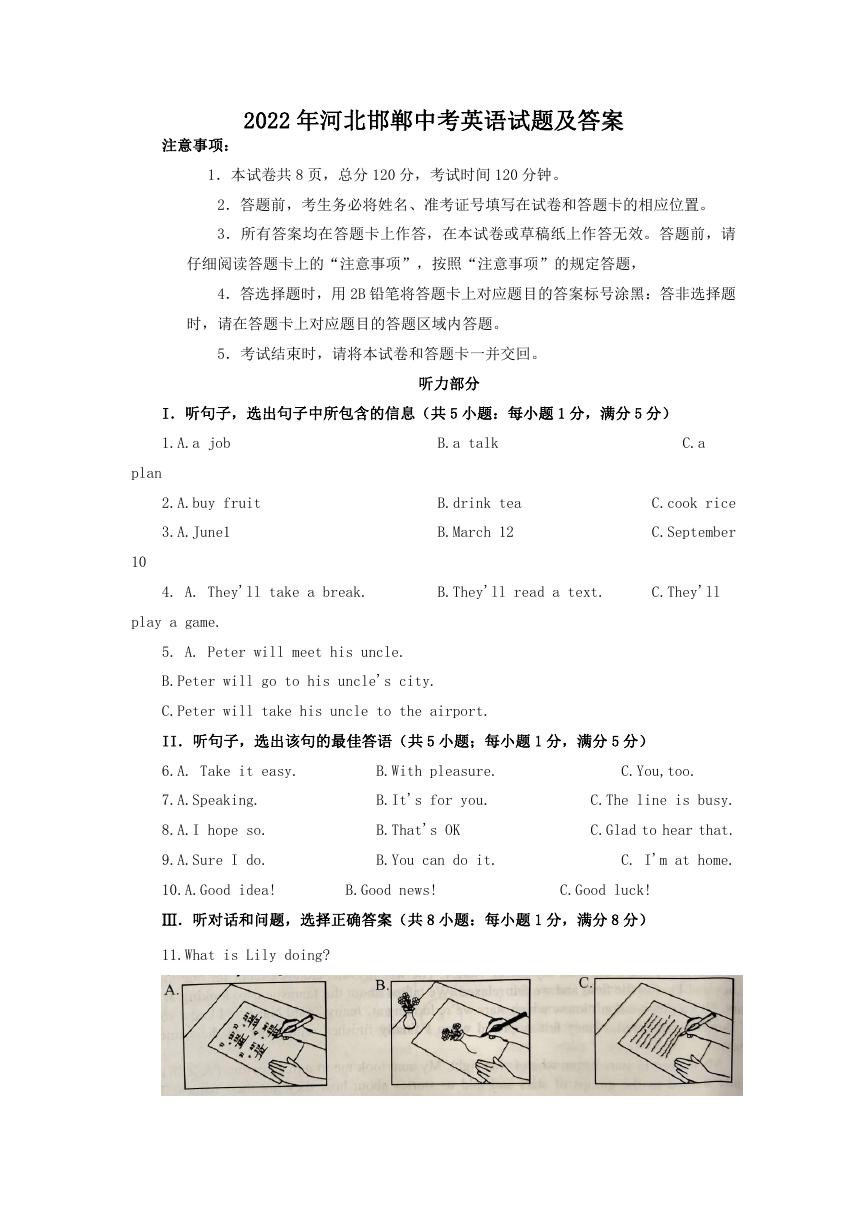
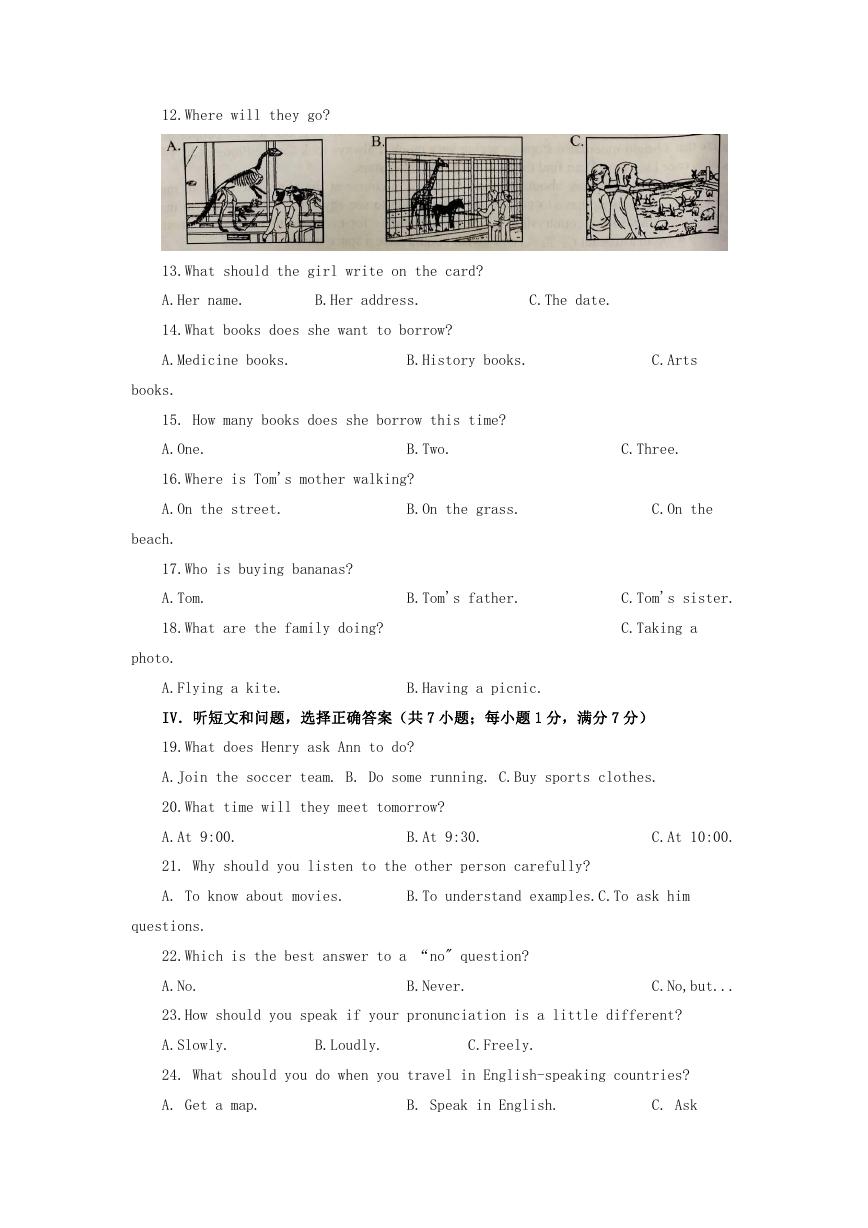
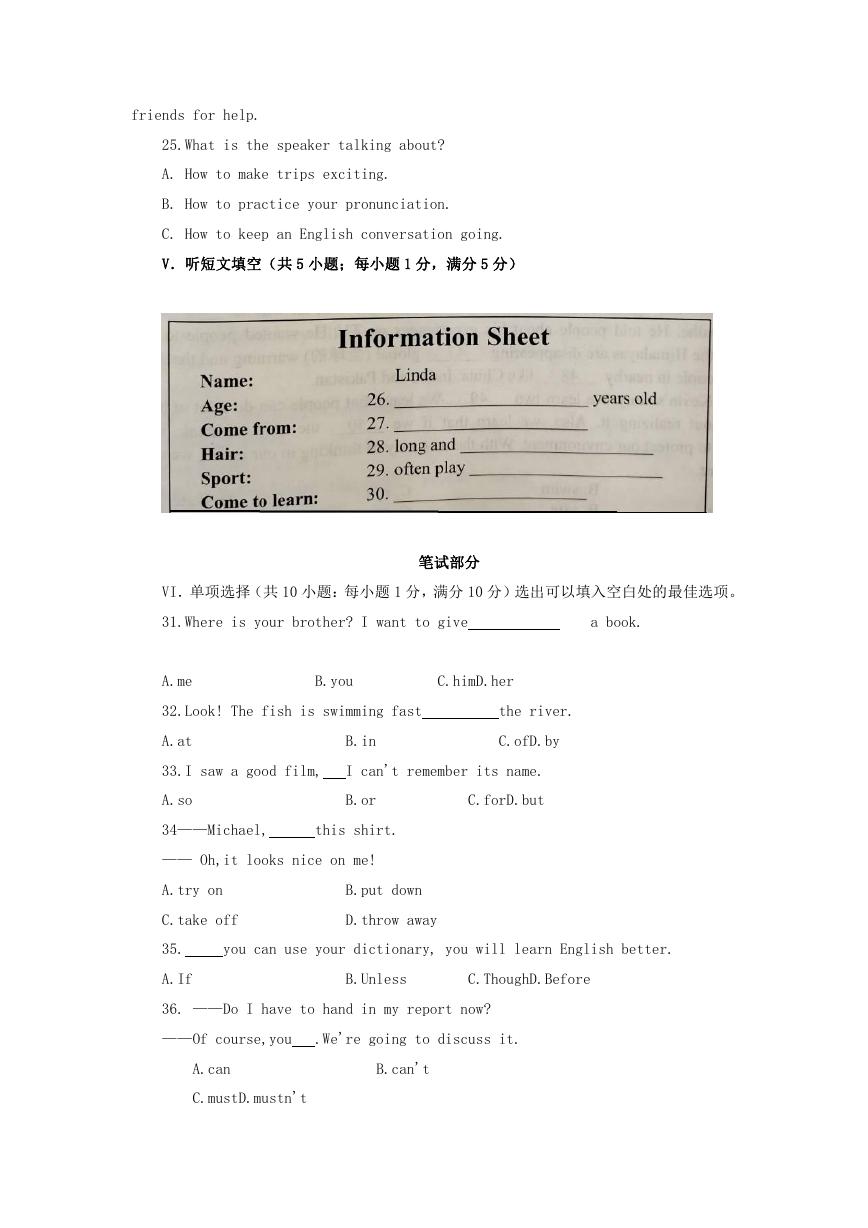

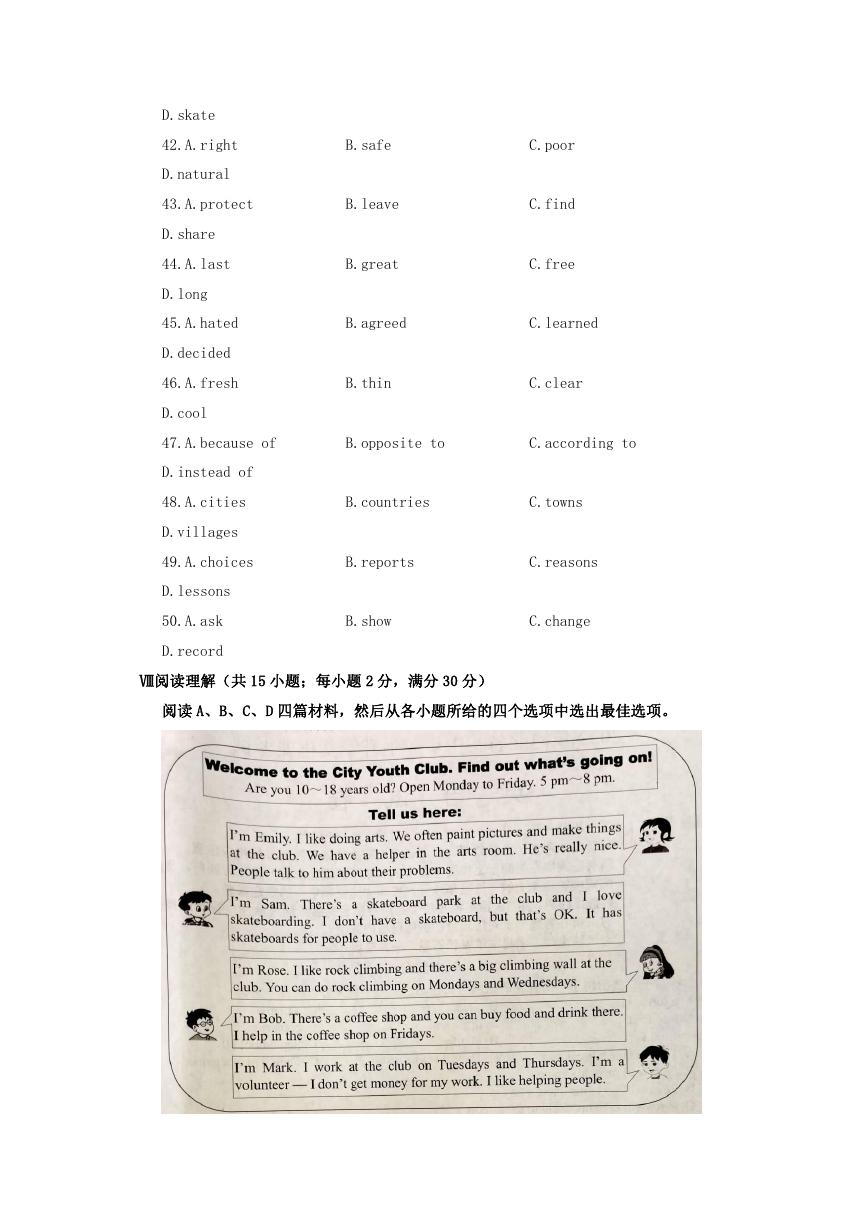
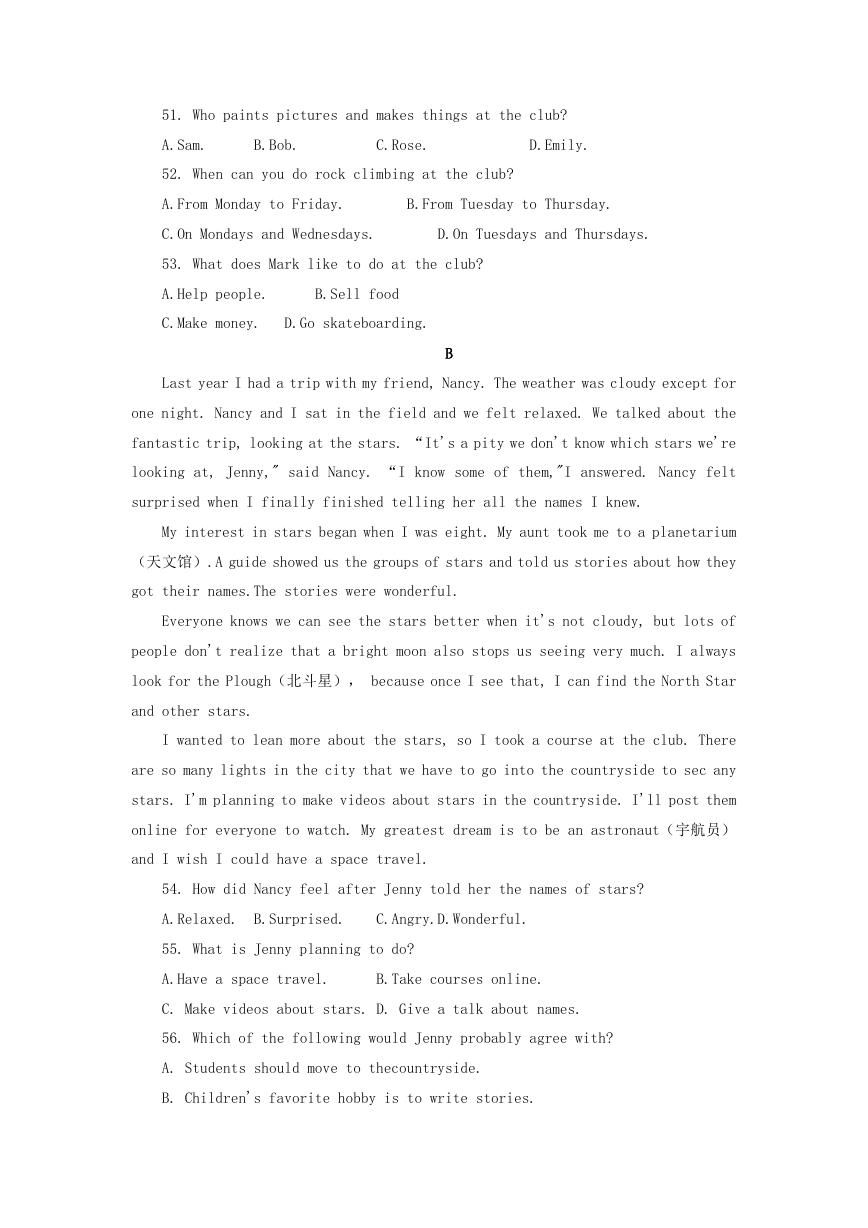
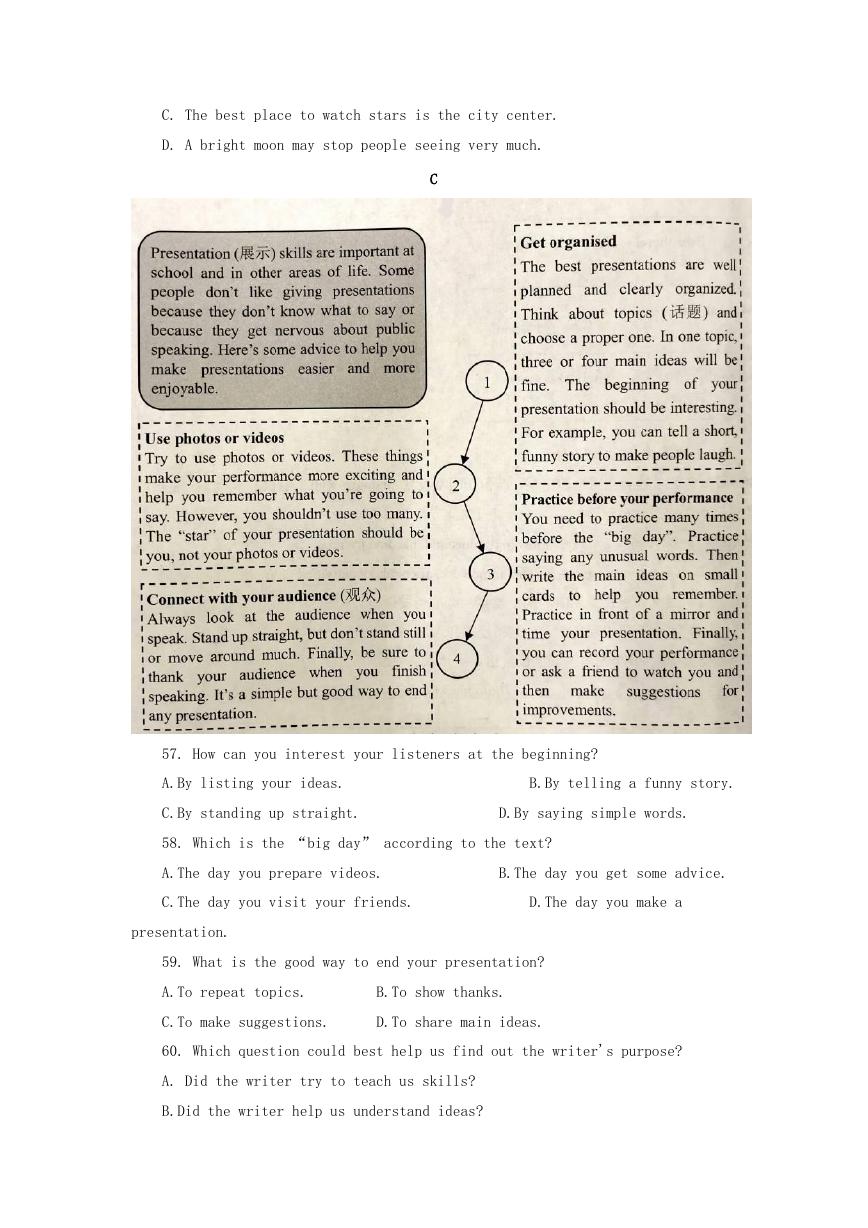
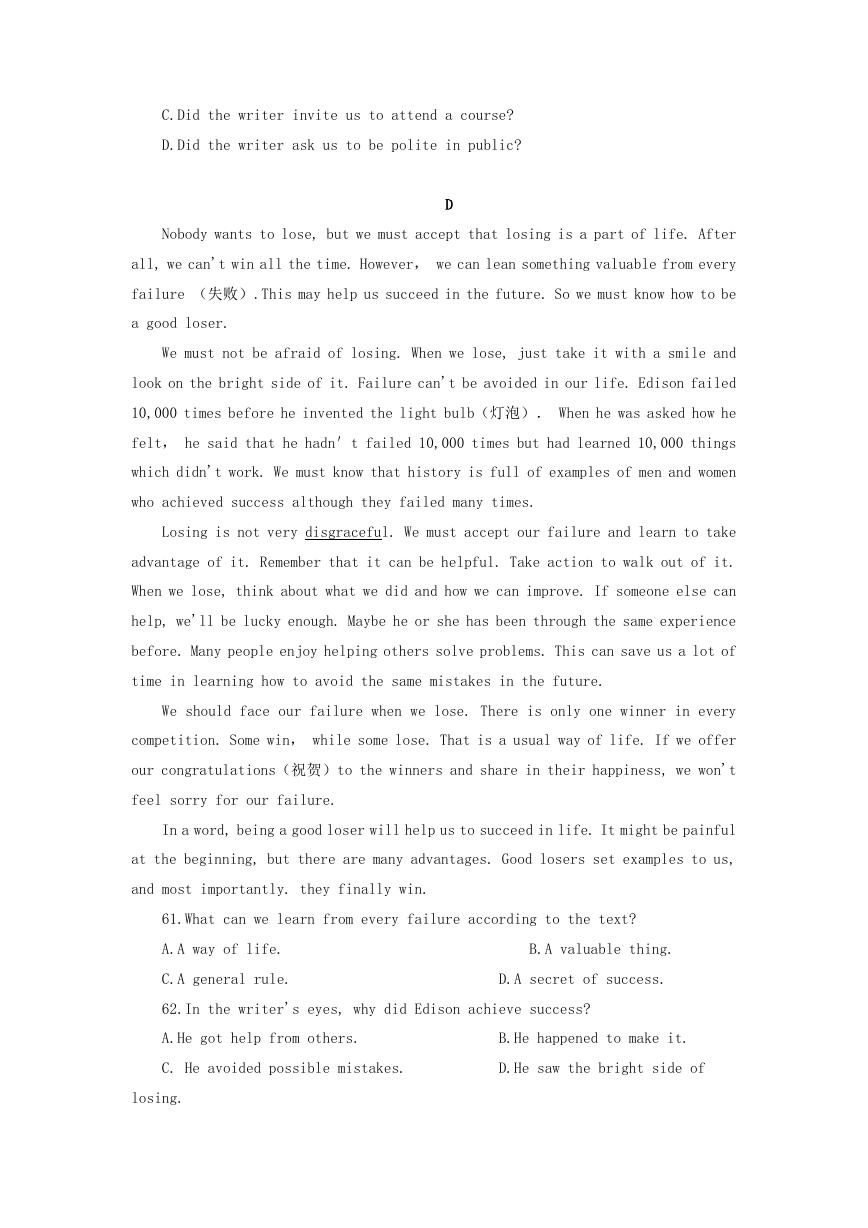








 2023年江西萍乡中考道德与法治真题及答案.doc
2023年江西萍乡中考道德与法治真题及答案.doc 2012年重庆南川中考生物真题及答案.doc
2012年重庆南川中考生物真题及答案.doc 2013年江西师范大学地理学综合及文艺理论基础考研真题.doc
2013年江西师范大学地理学综合及文艺理论基础考研真题.doc 2020年四川甘孜小升初语文真题及答案I卷.doc
2020年四川甘孜小升初语文真题及答案I卷.doc 2020年注册岩土工程师专业基础考试真题及答案.doc
2020年注册岩土工程师专业基础考试真题及答案.doc 2023-2024学年福建省厦门市九年级上学期数学月考试题及答案.doc
2023-2024学年福建省厦门市九年级上学期数学月考试题及答案.doc 2021-2022学年辽宁省沈阳市大东区九年级上学期语文期末试题及答案.doc
2021-2022学年辽宁省沈阳市大东区九年级上学期语文期末试题及答案.doc 2022-2023学年北京东城区初三第一学期物理期末试卷及答案.doc
2022-2023学年北京东城区初三第一学期物理期末试卷及答案.doc 2018上半年江西教师资格初中地理学科知识与教学能力真题及答案.doc
2018上半年江西教师资格初中地理学科知识与教学能力真题及答案.doc 2012年河北国家公务员申论考试真题及答案-省级.doc
2012年河北国家公务员申论考试真题及答案-省级.doc 2020-2021学年江苏省扬州市江都区邵樊片九年级上学期数学第一次质量检测试题及答案.doc
2020-2021学年江苏省扬州市江都区邵樊片九年级上学期数学第一次质量检测试题及答案.doc 2022下半年黑龙江教师资格证中学综合素质真题及答案.doc
2022下半年黑龙江教师资格证中学综合素质真题及答案.doc